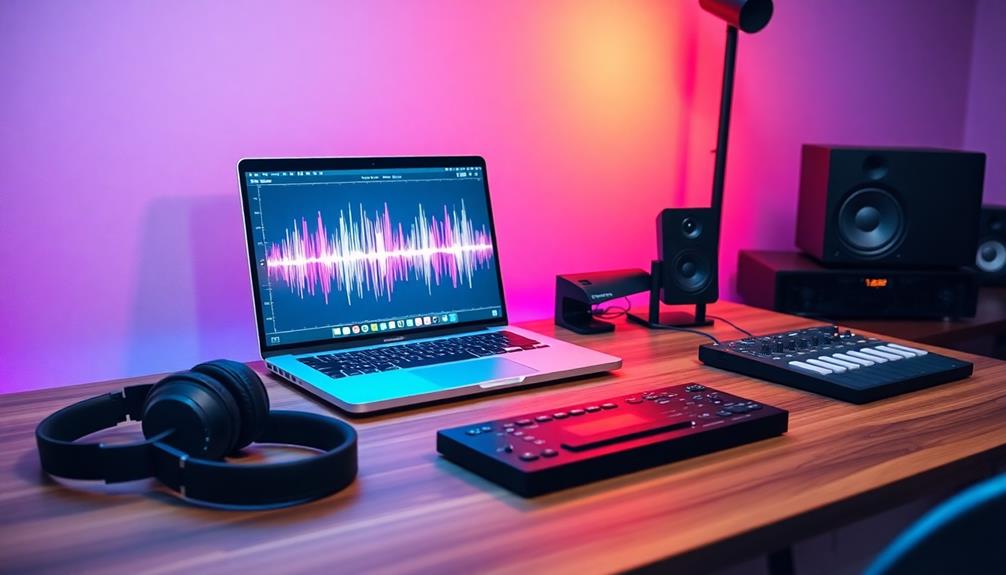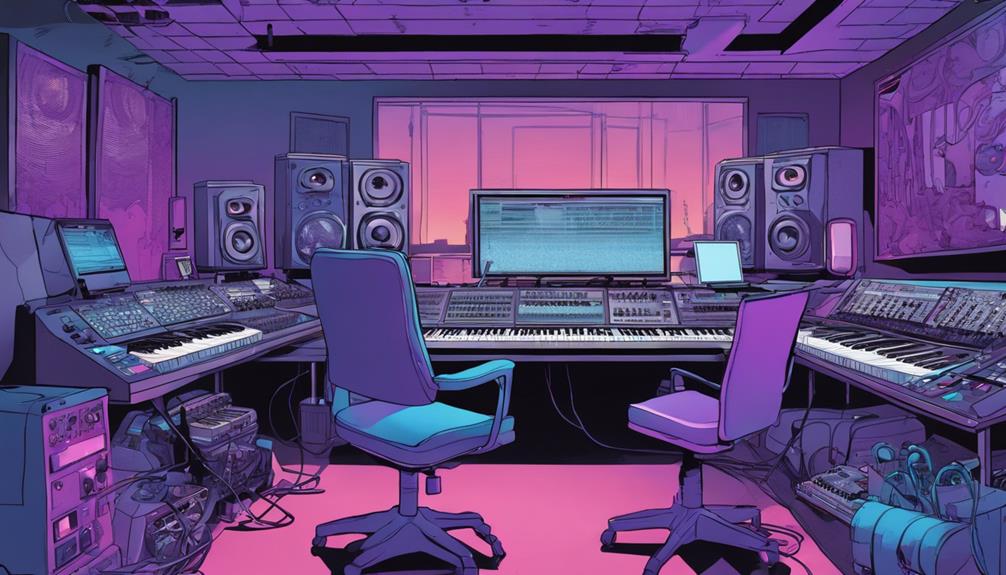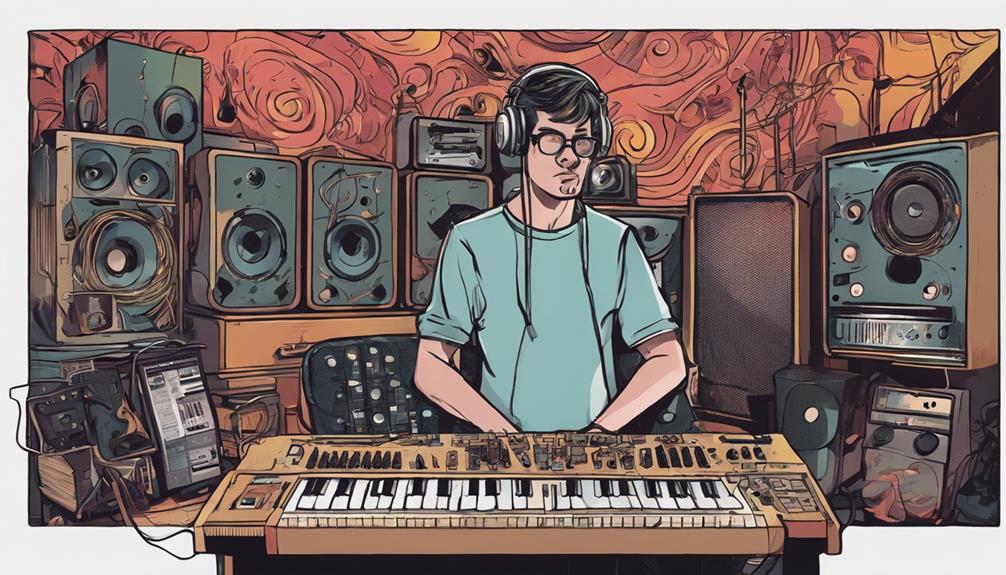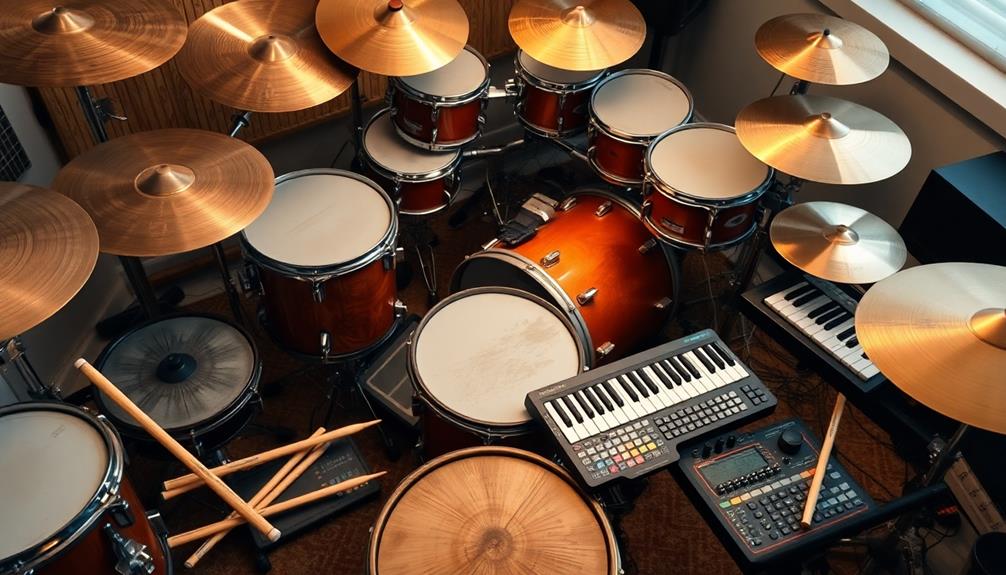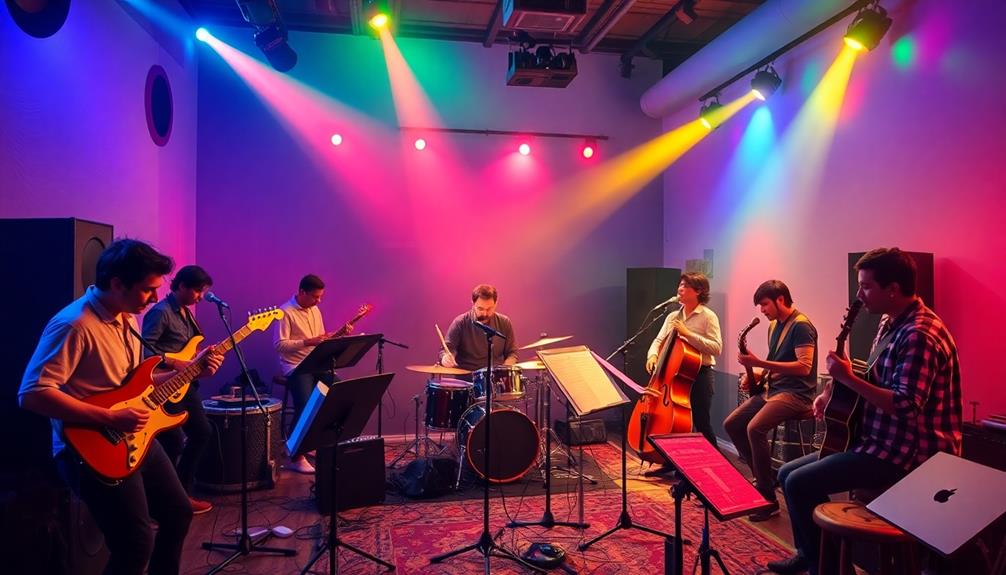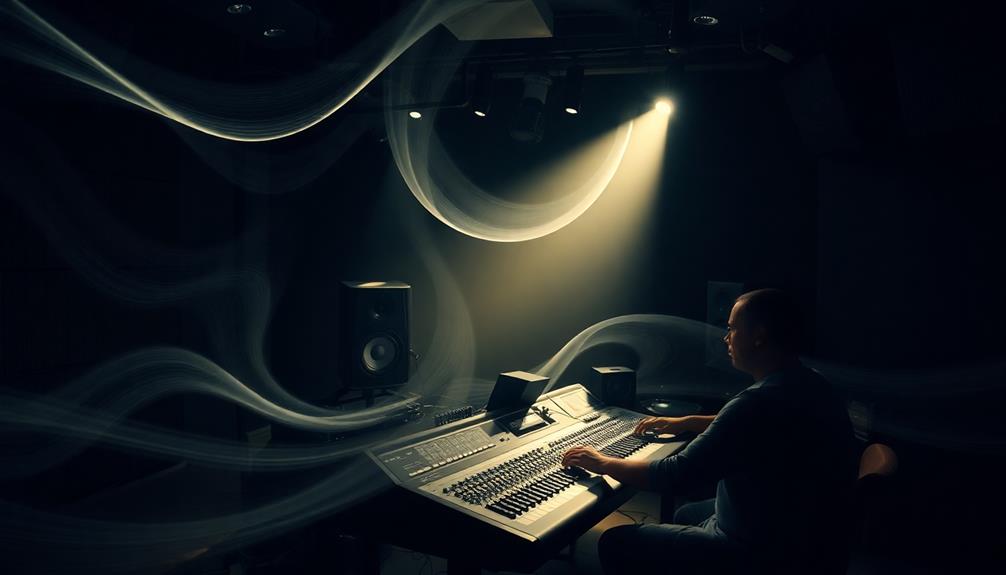When I'm setting up my silent music production PC, I always recommend the Corsair RM1000e and the NZXT C1000 Gold. The Corsair RM1000e has an 80 Plus Gold efficiency rating, fully modular design, and a whisper-quiet fan, making it ideal for studios. Meanwhile, the NZXT C1000 Gold not only delivers impressive power but also features a Zero Fan Mode that guarantees silence under low loads. Both options enhance my studio experience by reducing noise and improving reliability. If you're curious about what else to take into account for a quieter setup, there's plenty more to explore!
Key Takeaways
- The Corsair RM1000e offers 80 Plus Gold efficiency and a quiet 120mm fan, perfect for reducing noise in studio settings.
- NZXT C1000 Gold features a Zero Fan Mode, keeping it silent under low loads, ideal for music production environments.
- Both power supplies are fully modular, allowing for customizable cable management to enhance airflow and minimize clutter.
- High efficiency ratings ensure lower electricity bills and reduced heat generation, contributing to a quieter workspace.
- Consider future-proofing with PCIe Gen 5 compatibility in the Corsair RM1000e for potential upgrades in your setup.
Corsair RM1000e Fully Modular Power Supply

When it comes to building a silent music production PC, the Corsair RM1000e Fully Modular Power Supply stands out as an excellent choice for those who demand both performance and quiet operation. With its 80 Plus Gold efficiency, I appreciate how it provides reliable power while keeping energy costs down. The fully modular design simplifies installation and cable management, allowing me to customize connections easily. Plus, its 120mm rifle bearing fan operates quietly, making it perfect for a studio environment. I love that it supports PCIe Gen 5 platforms, ensuring my setup stays future-proof. The seven-year warranty gives me peace of mind, knowing I've invested in a quality product that delivers stable performance even under load.
Best For: Those seeking a high-efficiency, quiet power supply for a performance-driven PC build, especially in silent environments like music production studios.
Pros:
- 80 Plus Gold efficiency helps reduce energy costs while providing reliable power.
- Fully modular design simplifies installation and allows for customizable cable management.
- Seven-year warranty offers peace of mind and assurance of product quality.
Cons:
- Some users report tight cable clips requiring extra force for removal.
- Initial odor from powder coat may be off-putting, though it dissipates quickly.
- A few users desire longer cable options for enhanced flexibility in larger cases.
NZXT C1000 Gold Fully Modular PC Gaming Power Supply

For those seeking a power supply that combines high performance with silent operation, the NZXT C1000 Gold Fully Modular PC Gaming Power Supply stands out as an exceptional choice. With 1000 watts of power and an 80 Plus Gold certification, it offers excellent efficiency and stability, making it perfect for demanding setups. I love its Zero Fan Mode, which keeps the 135mm fluid dynamic bearing fan silent under 50% load. The modular design simplifies cable management, though I've found the rigidity of some cables can be a bit tricky in tight spaces. Overall, it's a reliable option that enhances system performance, especially when upgrading from older PSUs. If aesthetics matter, its sleek design fits beautifully in all-white builds.
Best For: Those looking for a high-performance, quiet power supply that enhances system stability and efficiency in demanding gaming setups.
Pros:
- 80 Plus Gold certification ensures high efficiency and lower electricity bills.
- Zero Fan Mode allows for silent operation under low load conditions.
- Modular cable design simplifies installation and enhances cable management.
Cons:
- Some cables may be rigid, making them difficult to manage in tight spaces.
- Inserting the 12VHPWR / 12V-2×6 cable can be challenging due to compatibility issues.
- Users may desire individually sleeved cables for improved aesthetics.
Factors to Consider When Choosing Power Supplies for Quiet Music Production PCs

When I'm selecting a power supply for my quiet music production PC, several key factors come to mind. I pay close attention to noise levels, efficiency ratings, and the benefits of modular cables, as these can greatly impact my setup. Additionally, I always consider power output requirements and component compatibility to guarantee everything runs smoothly.
Noise Level Considerations
In the world of music production, selecting the right power supply is essential for maintaining a quiet workspace. When I'm in the zone, the last thing I want is distracting noise from my equipment. One of the first things I look for is a power supply with low-noise fan designs, like fluid dynamic or rifle bearing fans. These notably reduce operational sound levels, which is a game changer during recording sessions.
I also pay attention to units certified for 80 Plus Gold efficiency. They often come with advanced cooling systems that minimize noise from power spikes, especially under load. Additionally, I prefer fully modular cables, as they improve airflow and cable management, allowing my fans to work less and stay quieter.
Another aspect I consider is modern standby features, which enable power supplies to adjust delivery without engaging noisy fans. Finally, I make sure to check user reviews for minimal coil whine, as this can be particularly disruptive in audio-sensitive settings. By focusing on these noise level considerations, I can create a more serene environment for my music production.
Efficiency Rating Importance
Choosing a power supply with a high efficiency rating is essential for creating a quiet music production environment. An efficiency rating like 80 Plus Gold indicates that the power supply converts at least 87% of the input power into usable output. This efficiency reduces wasted energy and heat generation, which is critical when you're aiming for a silent studio.
Higher efficiency ratings also mean lower electricity bills, a significant consideration for studios that run equipment for long hours. Furthermore, efficient power supplies tend to run cooler, which minimizes the need for active cooling systems and, in turn, reduces fan noise—vital for maintaining an ideal recording space.
Many of these high-efficiency power supplies are built with advanced components that enhance stability and reduce ripple noise. This is particularly important when working with sensitive audio equipment, as any noise can disrupt your recordings. Additionally, a good efficiency rating can prolong the lifespan of your connected components, lowering the chances of failures that could halt your music production sessions. Investing in a high-efficiency power supply is a smart choice for both performance and peace in your studio.
Modular Cable Benefits
A fully modular power supply can greatly enhance your music production PC's performance and aesthetics. With this design, I can connect only the cables I need, which minimizes clutter and markedly improves airflow within the case. This is vital for maintaining a quiet environment while I'm working on my music.
Installation becomes a breeze, and cable management is far more straightforward. A cleaner setup not only looks better but also reduces noise from vibrations and loose cables. I've found customizing cable lengths in a fully modular setup particularly beneficial; it guarantees a tailored fit for my specific case, reducing strain on connectors that could otherwise lead to reliability issues and increased noise levels.
Moreover, high-quality, fully modular power supplies often feature premium sheathing that dampens cable vibrations, contributing to quieter overall operation. In my creative space, aesthetics matter, and opting for a fully modular design gives my build a more organized and professional look, which is just as important as performance. By prioritizing modular cable benefits, I'm setting myself up for a more efficient and enjoyable music production experience.
Power Output Requirements
When determining the right power supply for my quiet music production PC, I focus on several critical factors that guarantee peak performance. First, I calculate the total wattage my system requires, considering the CPU, GPU, and any additional components. This confirms the power supply can handle peak loads without strain.
Next, I look at the power supply's efficiency rating. I aim for at least an 80 Plus Gold rating, as it optimizes power usage and reduces heat generation—key for maintaining a quiet environment.
I also assess the number and types of connectors needed for my components, like PCIe for graphics cards and SATA for storage devices. This step is essential to confirm compatibility and sufficient power delivery.
Stable voltage output is another priority for me; it minimizes the risk of audio interference or system instability during intense tasks like music production. Finally, I make sure the power supply supports modern standards, like ATX 3.0, to handle transient power spikes effectively. By considering these factors, I can confidently select a power supply that meets my silent music production needs.
Component Compatibility Factors
While selecting a power supply for my silent music production PC, I pay close attention to component compatibility to confirm everything works seamlessly together. First, I verify the power supply has sufficient wattage to support all components, especially high-performance CPUs and GPUs, since they can draw significant power during demanding tasks.
I also check that the power supply complies with current ATX standards, like ATX 3.0 or 3.1, to enhance stability and handle potential power spikes from audio software. Fully modular designs are another key consideration, as they allow for customizable cable management, reducing clutter and improving airflow in my case. This is essential for maintaining a quiet operation.
Efficiency ratings matter too; I look for models with an 80 Plus Gold rating to minimize energy consumption and heat output, further contributing to a quieter studio environment. Finally, I prioritize power supplies with silent operation modes, like Zero Fan Mode, which helps keep noise levels low when my system is under light load. By focusing on these compatibility factors, I can create an ideal setup for my music production needs. Having a power supply with reliable energy efficiency and silent performance ensures that my workflow remains uninterrupted, allowing me to focus solely on creativity. Alongside choosing the right PSU, I also ensure that the rest of my components, including the best budget CPUs for music production, work seamlessly to deliver optimal performance without breaking the bank. This balanced approach allows me to build a powerful and quiet system tailored for professional audio work while staying within my budget.
Thermal Management Features
Selecting a power supply for my silent music production PC also involves considering thermal management features that contribute to a quieter environment. One key feature I look for is Zero Fan Mode. This allows the fan to stay off during low loads, which is perfect for those quiet music production sessions when I want to hear every note without interference. Additionally, I prioritize power supplies with high-quality, thermally-efficient components that generate less heat overall, reducing the need for active cooling. Pairing this with innovative designs like hybrid fan curves ensures I get one of the best cooling solutions for music production without sacrificing silence. This delicate balance of thermal performance and noise levels is essential for maintaining focus and capturing the subtleties of every sound.
I also prefer models with high-quality fluid dynamic bearing fans. They run more quietly and efficiently than standard fans, making a noticeable difference in noise levels. Additionally, I choose power supplies that use premium capacitors rated for higher temperatures, like those at 105°C. They enhance thermal management and reliability under load.
Fully modular designs are another aspect I prioritize. They simplify installation, improve airflow, and help reduce clutter in my PC case, which aids overall thermal management. Finally, I evaluate the efficiency ratings, such as 80 PLUS Gold. These ratings indicate lower power loss and reduced heat generation, contributing to a cooler and quieter operating environment. All these factors work together to guarantee that my power supply supports my silent music production needs effectively.
Future-Proofing Your Setup
Future-proofing my setup is vital when choosing a power supply for my quiet music production PC. I want to make certain that my investment lasts, so I look for power supplies with an 80 Plus Gold efficiency rating. This not only reduces energy consumption but also lowers my electricity bills, which is a smart choice for long-term use.
Fully modular power supplies are another key factor. They allow for customizable cable management, which helps enhance airflow and reduce clutter, keeping my workspace tidy and quiet. It's essential for maintaining the serene environment I need for music production.
I also opt for power supplies that support the latest standards, like ATX 3.0 or PCIe 5.0. This guarantees compatibility with future high-performance components, allowing me to upgrade without a hitch. Additionally, I pay attention to low-noise fan designs and features like Zero Fan Mode, as these greatly cut down on operational noise.
Frequently Asked Questions
What Is the Ideal Wattage for a Silent Music Production PC?
When building my silent music production PC, I've found that an ideal wattage is around 500 to 750 watts. This range provides plenty of power while ensuring quiet operation, perfect for a focused studio environment.
How Do Power Supplies Affect Audio Quality in Music Production?
Did you know that a poor power supply can introduce noise, impacting your audio quality? I've noticed that clean power reduces unwanted hums, helping me achieve clearer recordings in my silent music production setup.
Can I Use a Gaming Power Supply for Music Production?
I've found that using a gaming power supply for music production can work, but it might generate unwanted noise. Always prioritize a quiet, reliable option to guarantee the best audio quality for your projects.
What Is the Lifespan of a Quality Power Supply?
I've found that a quality power supply typically lasts around 5 to 10 years, depending on usage and environmental factors. Regular maintenance and proper cooling can help extend its lifespan, ensuring reliable performance for my projects.
Are There Specific Brands Known for Silent Power Supplies?
When I look for silent power supplies, I often consider brands like Seasonic and Corsair. They're known for their reliability and quiet operation, which definitely enhances my overall music production experience in the studio.
Conclusion
In summary, investing in a high-quality power supply like the Corsair RM1000e or the NZXT C1000 Gold can truly transform your silent music production setup into a sonic paradise. With their whisper-quiet operation and unmatched efficiency, these power supplies will make you feel like you've revealed the secret to studio magic. Remember, the right choice not only enhances your experience but also future-proofs your gear, ensuring your creativity flows without a hitch. Happy producing!


